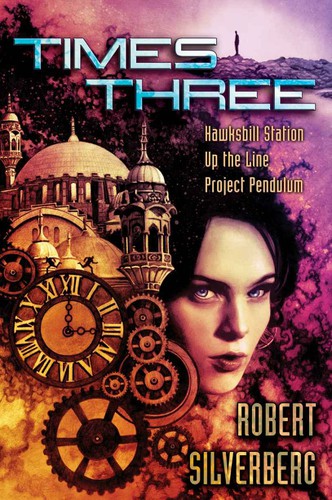Review: Times Three [★★★★★]
Times Three
by Robert Silverberg
My rating: ★★★★★
Read From: 23 February 2015 - 28 February 2015
Goal: Specific Authors
Time travel stories are my favorite sub-genre of science fiction. I've always loved the idea of visiting other times. I'd like to experience history directly. I'd love to sit in the audience for the first performance of Handel's Messiah or one of Beethoven's symphonies. I'd love to experience Teddy Roosevelt's charisma for myself. What was imperial Rome like, at the height of its power?
I'd also like to experience the planet as it existed in the past. I'd love to see what it would be like to walk through the forests that used to sit where Buffalo now stands. What would it be like to hear Niagara Falls from a distance and walk up to it through the trees? What did the Great American Plains really look like, during the pioneer days?
In this collection, Robert Silverberg provides three time travel stories that touch on these elements. I've read a lot of time travel stories and these three are all worthy of a place in my personal top ten list.
Hawksbill Station
Hawksbill Station is the perfect prison for political dissidents. Instead of spending money to guard them or courting political dissent by executing them, just exile them to the past instead. In this case, the late Cambrian era. The only form of life is trilobites; everything else is rock and water. There are no trees, no grasses, no ferns, no birds, no fish, no mammals, nothing. There's nowhere for the prisoners to escape to and no way they can interfere with history, to change the world of their past.
When I first read this story, I fell in love with Silverberg's description of the bleakness of the late Cambrian era. It's haunting, in the best possible way, and makes me excited about that part of the Milwaukee Public Museum's pre-history exhibit in a way that probably mystifies everyone else.
But the setting is almost the least important part of this story. "Hawksbill Station" is really a character study of Jimmy Barrett, the King of Hawksbill Station. He was a reluctant revolutionary long before he was a political prisoner. Silverberg invites us into his life, both at the beginning and end. It's a moving story where the time travel, as fascinating as it is, is the least important part of the story.
Up the Line
This is a more comic story. Judson Daniel Elliot III is a bored young man, who allows himself to be talked into a job as a Time Courier, a tour guide of the past, because of his love for historic Byzantium. A job as a Time Courier gives him the opportunity to criss-cross Byzantium's history, seeing all of the great events, people, and places.
Don't picture the Time Couriers as lantern jawed heroes, in love with the past and devoted to their duty. You should picture them more like a group of clock punchers, more dedicated to having fun on the job than to the job itself. And, well, with all of history to play around in, hijinks will ensue. Things will go wrong, and the police (the Time Police) may get called.
As is typical with Silverberg, the story revolves more around the characters than around the gizmos. It's a human story, but also a bit of a farce as we get to witness how human nature mixed with time travel can be a recipe for trouble.
Project Pendulum
Two identical twins: Eric and Sean Gabrielson are the subjects of the very first human experiment in time travel. They'll start their journeys through time together, from the same platform. They'll both move through time, like a pendulum that's gradually increasing its swing. First Eric will move five minutes back while Sean moves 5 minutes forward. Then Eric will move 50 minutes forward (from the fixed reference point), while Sean moves 50 minutes backwards. They'll continue alternating swings through time, each swing taking them an order of magnitude further into the past and future.
That's the hook. Silverberg uses it to paint one vignette after another of both humanity's past and humanity's future. With the twins, we see an inauguration parade for President Harding, have an encounter with neanderthals, and get to experience the majestic grandeur of California's redwood forests, centuries before they were overrun by development and tourism.
This is another story, like "Hawksbill Station", that I'll love just for its beautiful descriptions of lost worlds. I'll never be able to see them in person, but Silverberg has a genius for helping me to see them in my imagination.
This entry was tagged. Book Review Review
